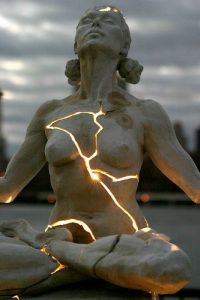SHE WHO IS NEVER NOT BROKEN
The title of this blog is indeed a double negative. The significance of this phrase is worthy of a grammatical error. It refers to a little-known goddess from Hindu mythology, called Akhilandeshvari. “Ishvar” is derived from the Sanskrit word meaning female power, or goddess. “Akhilanda,” essentially means “never not broken,” or “the always broken goddess.”
The pandemic has caused fear, trauma, and grief worldwide. We feel powerless to move forward in the global disaster that was 2020 and now into 2021. Fear has paralyzed us in our nothingness, and we have a great deal of trouble imagining the future. In grief we feel the trauma and loss and we feel utterly and completely broken. We turn the blame on ourselves for not being able to power through our grief. We literally are going to pieces. But if we think of Akhilandeshvari, she derives her power from her brokenness. She finds strength in the pieces that are not perfect. Life is imperfect and impermanent. But life is not worthless. When we treasure imperfection, it makes life even more precious.
Those who have experienced the physical loss that death brings, or even a breakup of a relationship or divorce, feel we have experienced the loss of our future. But if you look at it through another lens, when you are broken into pieces, you are evolving, changing, and adapting. You alone get to choose how you want to reassemble yourself. The feeling of brokenness that comes from fear can actually be a form of transmutation, allowing one to experience a fresh view of life. We see our body through a kaleidoscope of colors with refractions, and the wonder of possibilities open to us, to reinvent ourselves and our self-worth.
Akhilandeshvari is seen riding a crocodile in many pictures. I have read that the crocodile represents our reptilian brain where we store fear. A crocodile is a predator that spins its prey. By whirling and spinning our fears we can ride out our anxieties and sadness and spin them into obscurity. With pain and loss at the forefront as we grieve, if we reimagine our brokenness in a positive stance, we can open ourselves to acceptance of all our imperfections. We can forgive ourselves, and we can resuscitate those parts of us that have been covered in a veil of sadness for so long. This is the pathway to showing compassion and empathy.
 We know that we cannot mend our broken hearts. Grief is a transformational process. We feel the loss of those who have died. In our journey through grief, we are moving slowly through our brokenness to find an acceptance of the absence of that unique love that made us feel comfortable and loved. I will never stop grieving the loss of my husband, but I have learned to accept the void, and embrace my own ragged edges, and love them too.
We know that we cannot mend our broken hearts. Grief is a transformational process. We feel the loss of those who have died. In our journey through grief, we are moving slowly through our brokenness to find an acceptance of the absence of that unique love that made us feel comfortable and loved. I will never stop grieving the loss of my husband, but I have learned to accept the void, and embrace my own ragged edges, and love them too.
Please feel free to contact me via my website: www.lauriegrad.com. If you would like to sign up for my blogs follow this link:
http://lauriegrad.com/newsletter-signup/
And if you would like to buy my book: https://www.amazon.com/Jokes-Over-You-Come-Back/dp/1981137866/
Laurie is the author of the new book The Joke’s Over You Can Come Back Now: How This Widow Plowed Through Grief and Survived. She can be contacted via her website: www.lauriegrad.com or Facebook https://www.facebook.com/Laurie-Burrows-Grad-2060571070637592/


